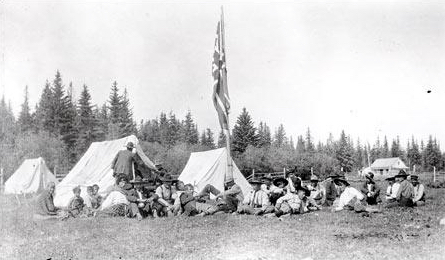Quick links
treaty money
DCHP-2 (Jul 2011)
Spelling variants:Treaty Money, Treaty money
n. — First Nations
an annual cash payment mandated by some treaties between First Nations and the Canadian government.
Type: 4. Culturally Significant — The term treaty money refers to the sum of money (see the 1872 and 1894 quotations) paid annually by the Canadian federal government to members of First Nations that signed historic treaties (see treaty) with the federal government (see the 1965 quotation) or have certain affiliations with Treaty First Nations (see AANDC reference). Historically distributed on Treaty Day (see Image 1), alongside items such as ammunition, hunting or fishing equipment and food, treaty money is generally a sum of just $5.00 (see the 1999 quotation) that is "now paid directly" (see Canadian Encyclopedia, s.v. "Treaty Day") under the formal classification of treaty annuity (see treaty annuity). In the 19th century this amount was equivalent to the price of five acres of land. Today, as a result of inflation, the sum will barely buy an ice cream cone. Calls that the contract implied by treaty money payments should be "honoured, at current values" (see the 2013 quotation) have so far gone unanswered. The term is most frequent in, but not exclusive to, Canada (see Chart 1).
Regardless of the sum, the payment of treaty money is usually integrated into some kind of celebration, such as a reconciliation event (see the 2012 quotation), that is "held annually on or off reserve" (see AANDC reference). Thus, treaty money is symbolic of the relationship between First Nations and the Crown.
Regardless of the sum, the payment of treaty money is usually integrated into some kind of celebration, such as a reconciliation event (see the 2012 quotation), that is "held annually on or off reserve" (see AANDC reference). Thus, treaty money is symbolic of the relationship between First Nations and the Crown.
See: Indian(meaning 1b),Indian Register,Indian treaty(def. 2),treaty(meanings 2, 3, 4),treaty annuity,treaty Indian,treaty payment (def. 1)
Quotations
1872
You have doubtless also been informed that one of the bands in this Province, that at Portage La Prairie, have likewise refused to take the Treaty money for this year.
1878
About 700 Indians were present to receive treaty money, and about $8,700 were paid out.
1894
"They live in the Reserve, as it is called -- a piece of the country allotted them by Government; and very good land it is, as indeed it ought to be, for we settlers have robbed them of their country. Not many of them are left now. Government pays them a sum called Treaty Money every spring and fall."
1910
Then I went exploring to the north, and took a Government job at the same time--paying treaty money to the Indians.
1939
Next year, Mr. Christie went out to Qu'Appelle to pay the treaty money, but to his amazement he found nearly 500 lodges assembled there.
1965
. . . Indians who have treaties (about half of Canada's total of 207,000) get treaty money. . . .
1968
There are about 200,000 Indians under Treaty in Canada today. Another 200,000 are not under Treaty. (There are also Indians who did not sign treaties but nevertheless have Treaty rights.) The great-grandparents of the present generation of Treaty Indians handed over their rights to the land in the late 1800s. In return, the federal government offered them a plot of land, schools, free houses and welfare (plus a few extras like $5 per year per person in Treaty money and a British flag and a few silver medals to each chief).
1977
The leaders of four Indian villages say they are going to refuse their annual treaty money while Judge Patrick Hartt continues his inquiry on the northern environment.
1989
I would urge native readers not to buy this book: at $10.95, it means blowing your treaty money for two years, plus interest. Instead, donate your cash to a worthy, struggling native student.
2007
The British Columbia New Democrats are accusing a former Liberal labour minister of improperly accepting treaty money for his lobbying work on behalf of a Vancouver Island First Nation.
2007
Beardy was stripped of his treaty money and treaty medal and the band was not allowed to have a chief until 1930.
2008
[...] where we learned the Government Agent, Mr. Pocklington, was paying the treaty money to the Sarcees.
2012
Representing the Crown, RCMP members oversee the handing out of treaty money during the journey of reconciliation event at Prairieland Park on Thursday.
2013
Federal officials must snicker as they prepare the token $5 annuity payments handed out on Treaty Day. Canada received the oil and gas, minerals and timber in Ontario, Manitoba, Saskatchewan, Alberta, British Columbia and the Northwest Territories for an amount now eroded to meaninglessness by inflation.
What Canada refuses to acknowledge is that the value native land in the hands of aboriginal people from the 1870s onward was fixed by statutory instrument under the Dominion Lands Act at the value of one acre of land, inclusive of mineral title. When the numbered treaties were signed, treaty money was either redeemable in gold or for land (including its mineral rights), at what was then $1 an acre. This must be honoured, at current values. Therefore, when treaty chiefs talk about “resource revenue sharing” they have good cause.
References
- AANDC • "Treaty Annuity Payments "
- The Canadian Encyclopedia • "Treaty Day"
Images
